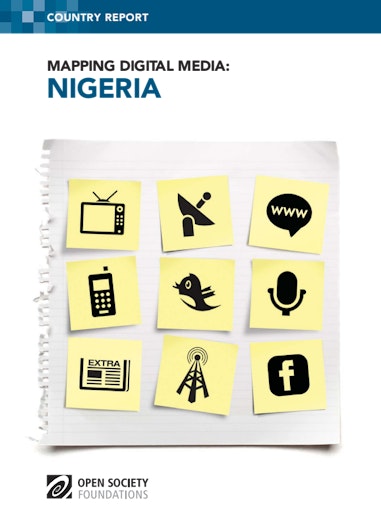The Mapping Digital Media project examines the global opportunities and risks created by the transition from traditional to digital media. Covering 60 countries, the project examines how these changes affect the core democratic service that any media system should provide: news about political, economic, and social affairs.
Nigeria has a relatively high internet penetration rate, driven primarily by a rapid expansion of mobile platforms. Recent figures suggest that over a third of the population have access to the internet and there are over 50 mobile phones per 100 Nigerians. However, internet access is concentrated geographically within just 16 percent of the country, and overwhelmingly within urban areas. Access to digital broadcasting platforms is largely contained within pay-TV networks, and free-to-air digital broadcasting is still embryonic.
Regarding free-to-air, there are currently no legal requirements on broadcasters to facilitate citizen access to digital platforms, nor any measures to ensure its affordability. Regulatory pressure has been applied to commercial broadcasters, but state broadcasters have been criticized for failing to take a leadership role in driving the switch-over.
The report suggests that the development of the mobile sector offers the best hope for bridging regional and social divides in the medium term. But the enduring significance of these divides presents the most profound obstacle to Nigerian society reaping the benefits of digital media in terms of increased diversity, openness, and access.
Download
-
Mapping Digital Media: Nigeria (405.22 Kb pdf file)
Download the complete 96-page report.
Read more
Voices
What Does Independent Journalism Look Like in the Digital Age?

Journalists and media organizations can find themselves repressed because of inadequate or deliberately repressive policy. Mapping Digital Media examines the situation in 56 countries.
Voices
Early Days for Digital Media in Morocco
Digital media in Morocco continues to advance. With 105 percent mobile phone penetration in the country and a growing appetite for online news more change is on the way.
Voices
Mapping the Brave New Digital World
A series of reports investigates how the growth of digital media is affecting journalism and democracy in 60 countries.
